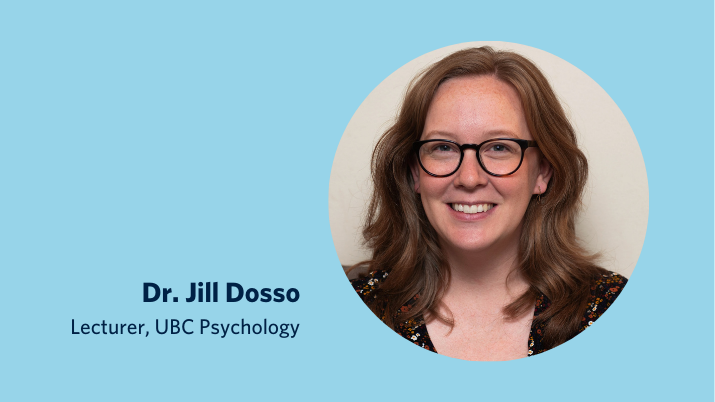

Dr. Jill Dosso, one of the department’s newest faculty members, teaches courses on biological and cognitive aspects of psychology.
“ In my teaching, one of my core values is being reflective and iterative – trying new things, being curious and creative, and inviting students to create the classroom community with me.”
Dr. Dosso joins us for a Q&A where we learn more about her approach to teaching, her research—and what she does outside of the classroom.
To start with, can you tell us a little about yourself?
I’m an incoming Lecturer at UBC Psychology where I’ll be teaching courses on the biological and cognitive aspects of psychology. Most recently before this, I was a postdoc at BC Children’s Hospital, and I loved that. I’ve been in Vancouver for about a decade now, but I grew up in Saskatchewan and I think I that warm small-town culture is still a big influence on me. And I try to never take the ocean and mountains for granted!
What kinds of questions do you try to answer through your research?
My research looks at people’s experiences with smart technologies like social robots, generative AI, and health wearables. The manufacturers of these devices tend to make broad claims about their capacity to support users’ mental health – characters that befriend, educate, and adapt, sensors that reassure, etc. – but it is not clear if these claims are aligned with the real needs and priorities of users, particularly those from vulnerable clinical populations. I use methods like co-creation workshops and qualitative interviewing to centre the perspectives of persons with lived experiences of dementia and pediatric anxiety in my work.
How would you describe your approach to teaching?
I think that psychological science and university teaching can really be siblings. Working in research in our discipline trains you to be precise in your thinking, to create systems and protocols that are as fair and equitable as you can make them, and to approach measurement in a technical, statistical way. All of these skills are so applicable in the classroom! In my teaching, one of my core values is being reflective and iterative – trying new things, being curious and creative, and inviting students to create the classroom community with me.
What can you learn from your students?
I have so much to learn from my students! UBC students are smart, diverse, and interdisciplinary. Teaching and research practices in Psychology continue to evolve, and students are the ones on the cutting edge of that. I’m particularly excited to hear about technology’s role in their lives and how they make sense of that. There’s a lot we need to understand about those experiences from a research perspective.
What do you like to do in your free time?
I’m a big science fiction reader, like many of my fellow academics. My partner owns a coffee roastery, so you’ll often find me amidst strange coffee equipment and mysterious metal parts with a hot drink in hand. We also have two goofy little kids, so I’d say my free time is fairly truck-themed these days.
Join us in welcoming Dr. Dosso to UBC Psychology!


